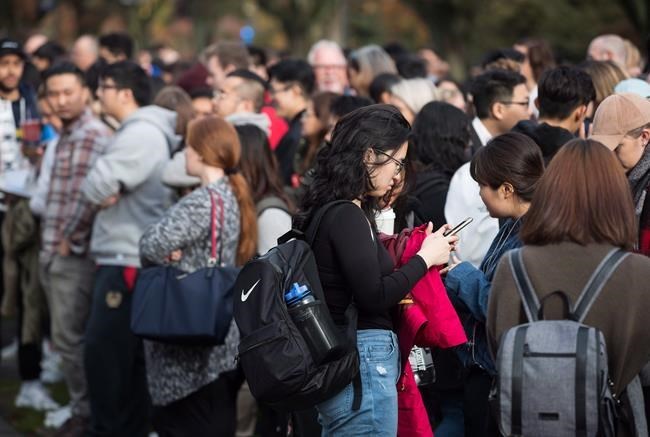TORONTO — Ontario will limit cellphone use in classrooms, restrict access to all social media networks and ban vaping on school properties starting this fall, the province's education minister announced Sunday.
Stephen Lecce unveiled the new measures at a morning news conference, touting them as necessary steps to improve safety in schools and help students focus in class.
"Every parent and teacher we speak to has shared the growing problem of cellphone distractions in class during instructional time, in addition to the disturbing rise of vaping in schools amongst our youth," he said.
"We need to be bold. We need to be comprehensive. And we need to act with urgency today."
The government has put together a "comprehensive plan" to curb distraction levels among the province's students, Lecce said, including restricting cellphone use and banning vaping in schools.
"Our policy includes enforcement to ensure compliance and consistency provincewide through these changes that will be coming into effect this fall," he said.
"We will be denying cellphone use during instructional time."
Kids in kindergarten to Grade 6 will be required to keep phones on silent and out of sight for the entire school day, unless they get explicit permission from an educator, while those in grades seven and up will see cellphone use banned during class time.
"If they do not comply, they will be asked to surrender their phones or they could be sent to the office," Lecce said.
"There are progressive discipline policies listed in this. It can include up to suspension if there is repeat violations."
Quebec and British Columbia have already made similar moves to ban the use of cellphones in class, but Lecce said Ontario will be the first province to block access to all social media platforms on school networks and devices.
Report cards will now also include comments on students' distraction levels in class.
The Progressive Conservative government had asked school boards to come up with their own cellphone policies in 2019, but Lecce said the results were mixed. A provincewide policy will be stronger and clearer, he said.
"Some boards developed strong policies, and many developed policies that led us to where we are today," he said, pointing to high rates of students distracted by their phones.
The Ontario Secondary School Teachers' Federation remains skeptical about whether a blanket ban will improve matters, the group's president said Sunday.
"I'm not really sure how this is going to change anything going forward," said Karen Littlewood.
Teachers are hesitant to take away students' phones because they would be responsible if the devices are lost, damaged or stolen, she said.
"It leads to so many issues and so many problems," she said.
It will fall to school staff to decide when the use of technology is appropriate, and Lecce said he will "have the backs" of the teachers, principals and superintendents who will be the ones enforcing the new government policy.
The changes reflect some of the demands made by the Elementary Teachers' Federation of Ontario in its most recent round of bargaining with the province.
The group suggested the changes as a way to address increasing violence and disruption in schools, the federation said in a statement issued Sunday.
But the union says it will reserve judgement on the new policies until it has seen the full range of changes in detail.
Concerns about social media and its effects on students are not confined to government officials. Four of Ontario's largest school boards announced plans last month to sue the parent companies of Facebook, Instagram, Snapchat and TikTok.
The schoolboards allege the social media platforms are disrupting student learning, contributing to a mental health crisis and leaving educators to manage the fallout.
The Toronto District School Board, the Peel District School Board, the Toronto Catholic District School Board and the Ottawa-Carleton District School Board filed four separate but similar cases in Ontario's Superior Court of Justice in late March.
The lawsuits claim the social media platforms are designed for compulsive use and have rewired the way children think, behave and learn.
In addition to the new restrictions on cellphones and social media use, Lecce said vaping will be banned in all school alongside tobacco, nicotine and cannabis products.
Students caught carrying such products will have them confiscated, and schools will be required to notify parents if that happens, he said.
Lecce said higher rates of vaping among youth are "deeply concerning" and unacceptable.
Thirty per cent of Canadian youth aged 15 to 19 had tried vaping as of 2022, the most recent Health Canada data shows. That's compared to just 14.7 per cent of people over the age of 25.
The Ontario government announced last month that more security cameras and vape detectors will be installed in schools. The province earmarked $30 million in funding for school safety in the most recent budget.
This report by The Canadian Press was first published April 28, 2024.
— With files from Laura Osman in Ottawa
Maan Alhmidi, The Canadian Press



